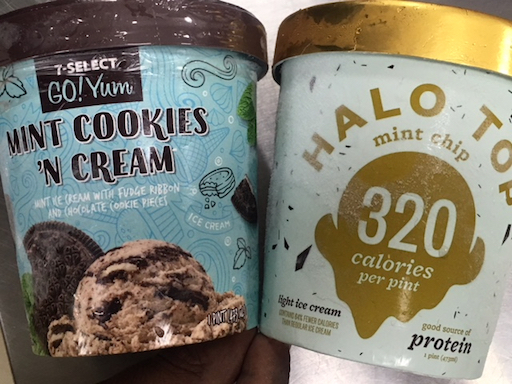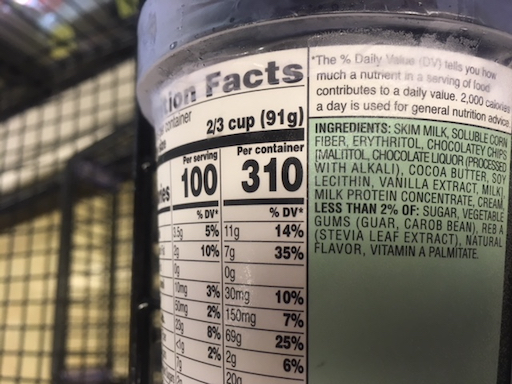My Latest Ice Cream Obsessions: But What About the New Artificial Sweeteners Used?

My latest obsession is mint chocolate chip ice cream. It's a flavor I settled on after first trying several of the 7-Eleven brand ice creams at my corner store and got excited by their high quality - with a favorable price to boot. I started with chocolate truffle caramel. It tasted amazing! I had to try others. Next was pecan caramel. It was just as amazing! Cookie dough, not so much. But when I sampled Mint Cookies 'N Cream, my taste buds danced the jig when they encountered the cool, natural minty flavor (it's not colored green!) melded with swirls and bits of intense dark chocolate, and the smooth, rich mouth-feel.
While I and many of my Georgetown neighbors experimented with various flavors, we were surprised by the superior "7-Select" ice creams. So excellent that I believe they would compare favorably with any top of the line ice creams like Haagen Dazs or Ben & Jerry's. But as I was eating carton after carton, the calorie and saturated fat content was getting under my skin, especially given how often I indulged (Oops!).
So, when I saw "Halo Top" Mint Chip with only 310 calories in the whole pint, compared with 7-Select's 1,000, I decided - reluctantly and after months of avoiding it - to give it a try based on many of my clients' recommendations: I found it delicious and rich, light and airy too. I loved it! Of course, it's not Mint Cookies 'N Cream, but is a very welcome and satisfying substitute.
As is my habit, when I perused the ingredient list, though, I noticed a new sweetener I hadn't heard of before called erythritol. I was alarmed. Several artificial sweeteners, such as saccharine, sucralose and aspartame increased insulin resistance, a precurser to diabetes, and even increased abdominal fat, the unhealthiest - and most unsightly, as I watch mine expanding - type of body fat, according to many recent studies. Since people rely on my advice for their health, I had to research the additive to make sure it was safe.
The explanation for this surprising news about the negative affect of non-caloric artificial sweeteners (NAS) is the disturbance the artificial sweeteners seem to cause in your microbiome, the 100 million bacterial organisms in your digestive tract, collectively called the microbiome and are akin to a fully functioning organ. The studies, described in the journal Cell Metabolism, have been consistent and repeatable. In one study, healthy volunteers who were not consumers of NAS were fed saccharine daily for one week. A majority of the subjects experienced poorer glycemic response (a precurse to diabetes, and a cause of excess body fat) within one week and had altered intestinal microbiota. Other studies one published in Nature, found similiar results.
Bad news for people with or without diabetes.
But what about erythritol in so many of my new favorite treats for those of us who are sweet junkies? Is it okay? It is healthy? Unhealthy? Does it increase body fat, too?

Erythritol seems unique among NAS, even compared to other sugar alcohol sweeteners such as sorbitol, xylitol, mannitol, and maltitol. That's because it has a slightly different, but significant, chemical make-up. Erythritol has many advantages over any NAS. It naturally occurs in nature so does not contribute to environmental damage as does sucralose. It's not as sweet - 60 to 80 percent of sugar, and easily mixes with other sweeteners (Halo Top Mint Chip adds Stevia, a natural sweetener known for its healthy qualities, but not as palatable as erythritol). Erythritol has no aftertaste. It improves mouth feel. Most of it is not metabolized by the body - 90 percent of it travels through the GI tract unchanged, so it doesn't lead to the diarrhea caused by other sugar alcohol sweeteners. On top of all of those benefits, erythitol is a free-radical scanvenger, that is, an anti-oxidant - with potential health improving qualities. It even prevents dental carries. Crazy, huh?
Erythritol has been approved as an artificial food sweetener in 60 countries. It's used as a sweetener, but also has other sensory qualities, such as texture, flavor and color. But it's expensive to produce, which explains why these new delicious low calorie products using erythritol tend to be much more expensive than other "diet" foods.
All of that said - I'm putting my readers and clients on notice. I'll be really pissed off if Halo Top's Mint Chip starts disappearing from grocery store shelves - especially those at my local 7-11 (and don't pretend you don't know which one that is). Be warned!
